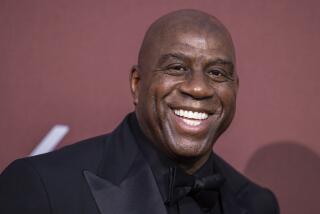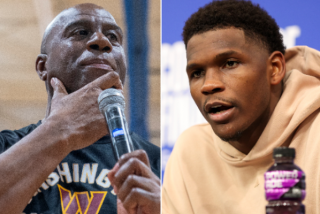Magic Johnson on Larry Bird: “We’re mirrors of each other”
In one corner sat Magic Johnson. He talked. He laughed. He smiled. In another corner sat Larry Bird. He spoke only when prompted. He sounded stoic. He usually looked serious.
Yes, the former Lakers and Celtics stars, and rivals, showcased once again how different their personalities are when they appeared Wednesday night on “Late Show with David Letterman” to promote “Magic/Bird,” a Broadway show that debuted at Longacre Theatre in New York. Even if their personalities remain different, though, their mind-sets remain the same.
“We’re mirrors of each other,” Johnson said. “I may smile a little bit more, but the way we play the game of basketball was exactly the same because we would do anything to win. We didn’t care about scoring points. We cared about winning the game and making our teammates better. That’s why we were able to change not only basketball but able to change the NBA, too.”
That’s why they also changed the nature of their relationship.
They initially kept their distance because they both wanted to maintain their competitive edge. They charted each other’s progress as a way to measure their own. They routinely worried about the other’s routine, so much so that Johnson had trouble sleeping and Bird worried if Johnson’s preparation surpassed his.
That’s why both were initially skeptical of filming a Converse commercial together in 1985. Bird relented simply because it took place in his hometown of French Lick, Ind. Johnson relented after his agent, Lon Rosen, persuaded him to reconsider. But that commercial proved a turning point because the two soon learned about each other over lunch as more than just rivals.
They then became close. Johnson made sure Bird found out directly when he was diagnosed in 1991 with HIV. They cherished playing together in the 1992 Dream Team. They collaborated on a book with famed sports writer Jackie MacMullan, “When the Game Was Ours,” about their rivalry and friendship. They then helped the “Magic/Bird” producers tell that same story.
“They did a great job of capturing our feelings and how we feel about one another,” Bird said. “But it’s all about the competition. If we can do something to compete against one another, I’d like to do that.”
They showed that competition still remains.
Bird acknowledged that pain still exists over his team, Indiana State, losing to Johnson’s team, Michigan State, in the 1979 NCAA championship game. Johnson jokingly laughed at Bird’s expense.
Bird jokingly argued the Celtics “got cheated in a lot of those games in the playoffs” to explain why Johnson’s Lakers beat Boston in the NBA Finals two out of three times. Johnson smiled.
Bird played along with Letterman’s idea that he should join an ownership group to buy a baseball team. After all, Johnson teamed up with Guggenheim Partners to purchase the Dodgers for $2.15 billion. Both Bird and Johnson jokingly embraced the idea.
“I wish we could compete the same way,” Johnson said.
Yet, when it came to comparing each other, neither bragged. Bird said Johnson was the better player because he beat him in NBA championships, 5-3. Johnson countered that Bird was the better player because he had a more balanced game. They had built enough goodwill to be honest about it.
“I’ve always respected my opponents and him greatly because of the fact he was so good,” Bird said. “Everybody said there was a hate element. There wasn’t hate. I just had so much respect. You never let your guard down because he was so good.”
“It made me feel good I was a thorn in his side,” Johnson said. “I’m supposed to be out there and go kick his butt. That’s what my job was, and his job was to kick mine. I didn’t want Larry to like me. He didn’t have to like me. But we both respected each other.”
RELATED:
‘Magic/Bird’ opens on Broadway in New York City
Magic Johnson on Larry Bird: ‘I like him now’
Magic Johnson discusses Dream Team’s superiority to Redeem Team
More to Read
All things Lakers, all the time.
Get all the Lakers news you need in Dan Woike's weekly newsletter.
You may occasionally receive promotional content from the Los Angeles Times.






